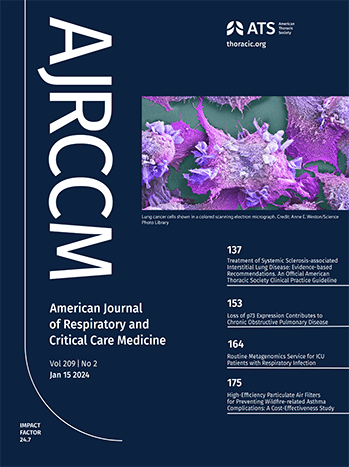针对阻塞性睡眠呼吸暂停的护理协调和依从性促进的同伴驱动干预:随机、平行小组临床试验。
IF 19.3
1区 医学
Q1 CRITICAL CARE MEDICINE
American journal of respiratory and critical care medicine
Pub Date : 2024-10-23
DOI:10.1164/rccm.202309-1594oc
引用次数: 0
摘要
理论依据阻塞性睡眠呼吸暂停(OSA)是一种常见疾病,通常采用持续气道正压(CPAP)疗法进行治疗,但患者依从性差的情况很常见,而且与患者的治疗效果和体验较差有关。我们测试了这样一个假设:与主动控制相比,通过交互式语音应答(PDI-IVR)系统进行同伴驱动干预能提高患者满意度(主要结果)、护理协调和 CPAP 依从性。方法 我们进行了一项为期 6 个月的随机平行组对照试验,试验对象是从 4 个中心招募的 CPAP 初学者和 CPAP 依从者,他们都经过培训,成为通过 IVR 系统提供支持的指导者。测量和结果 在 263 名患者中,通过意向治疗分析,干预组(4.57+0.71 的李克特量表评分)对睡眠特定服务的总体满意度(4.10+1.13;P4 小时使用时间)高于主动对照组(3.7+0.2 小时/晚;51.4+3.0% 的晚间使用时间大于 4 小时;P=0.014 和 P=0.023)。与积极对照组相比,患者对慢性病护理的评价略有增加,调整后差异为 0.33+0.12 (P=0.009);消费者对医疗保健提供者和系统的评价没有差异(调整后差异为 0.46+0.26;P=0.结论患者对护理服务、CPAP 依从性和护理协调的满意度在同伴通过 IVR 系统进行干预后有所提高。对同伴支持进行补偿的新付款政策可能会促进这种方法的实施。临床试验注册网址:www.CLINICALTRIALSgov,ID:NCT02056002。本文章由计算机程序翻译,如有差异,请以英文原文为准。
Peer-Driven Intervention for Care Coordination and Adherence Promotion for Obstructive Sleep Apnea: A Randomized, Parallel-Group Clinical Trial.
RATIONALE
Obstructive sleep apnea (OSA) is a common condition that is usually treated by continuous positive airway pressure (CPAP) therapy, but poor adherence is common and is associated with worse patient outcomes and experiences. Patient satisfaction is increasingly adopted as a quality indicator by healthcare systems.
OBJECTIVE
We tested the hypothesis that peer-driven intervention effected through interactive voice-response(PDI-IVR) system leads to better patient satisfaction (primary outcome), care-coordination, and CPAP adherence when compared to active-control.
METHODS
We performed a 6-month randomized, parallel-group, controlled trial with CPAP naïve patients recruited from four centers and CPAP-adherent patients who were trained to be mentors delivering support through an IVR system.
MEASUREMENTS AND RESULTS
In 263 patients, intention-to-treat analysis global satisfaction for sleep-specific services was better in the intervention group (4.57+0.71 Likert scale score) than in the active-control group (4.10+1.13; P<0.001). CPAP adherence was greater in intervention group (4.5+0.2 hours/night; 62.0+3.0% of nights >4 hours usage) versus active-control group (3.7+0.2 hours/night; 51.4+3.0% of nights >4 hours usage; P=0.014 and P=0.023). When compared to active-control group, Patient Assessment of Chronic Illness Care ratings was moderately increased by an adjusted difference of 0.33+0.12 (P=0.009); Consumer Assessment of Healthcare Provider and Systems ratings was not different (adjusted difference of 0.46+0.26; P=0.076); and Client Perception of Coordination Questionnaire was mildly better in the intervention group (adjusted difference 0.15+0.07; P=0.035).
CONCLUSION
Patient satisfaction with care delivery, CPAP adherence, and care-coordination was improved by peer-driven intervention through an IVR system. New payor policies compensating peer-support may enable implementation of this approach. Clinical trial registration available at www.
CLINICALTRIALS
gov, ID: NCT02056002.
求助全文
通过发布文献求助,成功后即可免费获取论文全文。
去求助
来源期刊
CiteScore
27.30
自引率
4.50%
发文量
1313
审稿时长
3-6 weeks
期刊介绍:
The American Journal of Respiratory and Critical Care Medicine focuses on human biology and disease, as well as animal studies that contribute to the understanding of pathophysiology and treatment of diseases that affect the respiratory system and critically ill patients. Papers that are solely or predominantly based in cell and molecular biology are published in the companion journal, the American Journal of Respiratory Cell and Molecular Biology. The Journal also seeks to publish clinical trials and outstanding review articles on areas of interest in several forms. The State-of-the-Art review is a treatise usually covering a broad field that brings bench research to the bedside. Shorter reviews are published as Critical Care Perspectives or Pulmonary Perspectives. These are generally focused on a more limited area and advance a concerted opinion about care for a specific process. Concise Clinical Reviews provide an evidence-based synthesis of the literature pertaining to topics of fundamental importance to the practice of pulmonary, critical care, and sleep medicine. Images providing advances or unusual contributions to the field are published as Images in Pulmonary, Critical Care, Sleep Medicine and the Sciences.
A recent trend and future direction of the Journal has been to include debates of a topical nature on issues of importance in pulmonary and critical care medicine and to the membership of the American Thoracic Society. Other recent changes have included encompassing works from the field of critical care medicine and the extension of the editorial governing of journal policy to colleagues outside of the United States of America. The focus and direction of the Journal is to establish an international forum for state-of-the-art respiratory and critical care medicine.

 求助内容:
求助内容: 应助结果提醒方式:
应助结果提醒方式:


